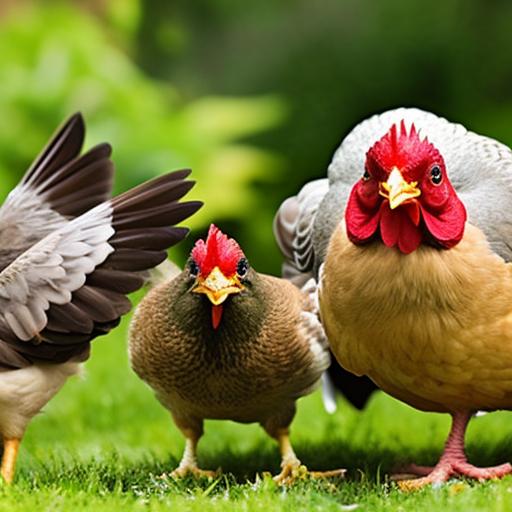Keeping chickens in your garden has become a popular trend in recent years, especially in urban areas. It offers a unique opportunity to have fresh eggs right at your doorstep, while also providing pest control and fertilization for your garden. Not to mention, chickens can also be wonderful pets that bring joy and entertainment to your outdoor space. If you’re considering adding chickens to your garden, there are a few important factors to consider. In this article, we will explore the benefits of having chickens in your garden, how to choose the right breed, setting up a safe and secure chicken coop, feeding and caring for your chickens, managing chicken waste, dealing with common health issues, legal considerations, and tips for integrating chickens with other garden pets and plants.
Key Takeaways
- Keeping chickens in your garden can be a fun and rewarding experience.
- Chickens can provide fresh eggs, natural pest control, and fertilizer for your garden.
- When choosing a breed of chickens, consider factors such as temperament, egg production, and climate adaptability.
- A secure chicken coop with proper ventilation, nesting boxes, and roosting bars is essential for the health and safety of your chickens.
- Feeding your chickens a balanced diet and providing them with clean water and regular veterinary care can help prevent common health issues.
Benefits of having chickens in your garden
One of the main benefits of having chickens in your garden is the access to fresh eggs. There is nothing quite like collecting eggs from your own backyard and knowing exactly where they came from. Fresh eggs have a richer taste and higher nutritional value compared to store-bought eggs. Plus, you have the satisfaction of knowing that your hens are well-cared for and living a happy life.
Another benefit of having chickens in your garden is their ability to help with pest control and fertilization. Chickens are natural foragers and will eat insects, slugs, and other pests that may harm your plants. They also scratch the soil, which helps to aerate it and distribute nutrients more evenly. Their droppings are high in nitrogen, phosphorus, and potassium, making them an excellent natural fertilizer for your garden.
In addition to their practical benefits, chickens can also be wonderful pets. They have unique personalities and can provide endless entertainment with their antics. Many people find joy in watching their chickens roam around the garden, interact with each other, and even respond to their names. They can be surprisingly affectionate and can form bonds with their human caretakers.
Choosing the right breed of chickens for your garden
When it comes to choosing the right breed of chickens for your garden, there are several factors to consider. Different breeds have different characteristics, such as egg-laying ability, temperament, and cold or heat tolerance. It’s important to choose a breed that suits your needs and climate.
If you’re primarily interested in having fresh eggs, you’ll want to choose a breed that is known for its egg-laying ability. Some popular egg-laying breeds include Rhode Island Reds, Leghorns, and Australorps. These breeds are known for their consistent egg production and can lay up to 300 eggs per year.
If you’re looking for chickens that are more docile and friendly, consider breeds like Silkies or Orpingtons. These breeds are known for their calm temperament and make great pets for families with children.
It’s also important to consider the climate in your area when choosing a breed. Some breeds are better suited for cold climates, while others thrive in hot climates. For example, the Plymouth Rock and Sussex breeds are known for their cold hardiness, while the Mediterranean breeds like Leghorns and Minorcas do well in hot climates.
Setting up a safe and secure chicken coop in your garden
Setting up a safe and secure chicken coop is essential to protect your chickens from predators and provide them with a comfortable living space. The coop should be sturdy and well-built to withstand any attempts by predators to break in. It should also have a secure door that can be locked at night to keep your chickens safe from nocturnal predators like raccoons or foxes.
There are different types of coops available, ranging from small portable coops to larger stationary ones. The size of the coop will depend on the number of chickens you plan to keep. It’s important to provide enough space for each chicken to move around comfortably and have access to nesting boxes and perches.
Proper ventilation is also crucial for the health of your chickens. The coop should have windows or vents that can be opened and closed to allow for fresh air circulation. This helps to prevent the buildup of ammonia from chicken waste, which can be harmful to their respiratory system.
In addition to ventilation, lighting is also important for the well-being of your chickens. Natural light is ideal, but if your coop doesn’t have access to natural light, you can use artificial lighting to simulate daylight hours. This helps to regulate their internal clock and promote healthy egg production.
Feeding and caring for your chickens in your garden
Feeding your chickens a balanced diet is essential for their health and egg production. A good quality chicken feed should be the main component of their diet. Look for a feed that is specifically formulated for laying hens, as it will contain the necessary nutrients for egg production.
In addition to chicken feed, you can also supplement their diet with kitchen scraps, fruits, vegetables, and grains. However, it’s important to avoid feeding them anything toxic or harmful, such as chocolate, onions, or avocado.
Fresh water is also crucial for your chickens’ well-being. Make sure they have access to clean water at all times. You can use a waterer specifically designed for chickens or a shallow dish that they can easily drink from.
Caring for your chickens involves regular monitoring of their health and well-being. Check them daily for any signs of illness or injury. Keep an eye out for changes in behavior, appetite, or egg production, as these can be indicators of health issues. It’s also important to provide them with a clean and comfortable living environment by regularly cleaning the coop and replacing bedding.
Managing chicken waste and keeping your garden clean

Managing chicken waste is important not only for hygiene but also for the health of your garden. Chicken manure is high in nitrogen, phosphorus, and potassium, which are essential nutrients for plants. However, if not managed properly, it can become a breeding ground for bacteria and parasites.
One method of managing chicken waste is through composting. Chicken manure can be added to a compost pile along with other organic materials, such as leaves, grass clippings, and kitchen scraps. The compost should be turned regularly to ensure proper decomposition and to prevent the buildup of harmful bacteria.
Another option is to use chicken manure as a direct fertilizer for your garden. However, it’s important to use it sparingly and avoid applying it directly to plants. Instead, mix it with other organic materials or spread it thinly over the soil surface.
Keeping the coop and surrounding area clean is also important for the health of your chickens and the overall cleanliness of your garden. Regularly remove soiled bedding and replace it with fresh bedding. Scrub the coop periodically with a mild detergent to remove any buildup of dirt or bacteria.
Dealing with common chicken health issues in your garden
Chickens, like any other animals, can be susceptible to various health issues. It’s important to be aware of common health problems that chickens may face and take appropriate measures to prevent or treat them.
Some common health issues in chickens include respiratory infections, parasites (such as mites or lice), egg binding, and bumblefoot (an infection on the foot). Regular check-ups by a veterinarian who specializes in poultry can help identify any potential health issues early on.
Vaccinations are also an important aspect of chicken health care. Depending on your location and the prevalence of certain diseases, your chickens may need vaccinations to protect against diseases like Marek’s disease or Newcastle disease. Consult with a veterinarian to determine which vaccinations are necessary for your flock.
In addition to vaccinations, there are various treatments and remedies available for common health issues. For example, respiratory infections can be treated with antibiotics, while parasites can be controlled with topical treatments or dust baths. It’s important to follow the instructions provided by a veterinarian or poultry expert when administering any treatments.
Legal considerations for keeping chickens in your garden
Before you decide to keep chickens in your garden, it’s important to familiarize yourself with the legal requirements in your area. Some cities or neighborhoods have specific regulations or guidelines regarding the keeping of chickens.
Check with your local government or zoning department to find out if there are any restrictions on the number of chickens you can keep, the size of the coop, or the distance from neighboring properties. It’s also important to find out if there are any specific rules regarding noise, odor, or waste management.
By following the local regulations and guidelines, you can ensure that you are keeping chickens in a responsible and legal manner. This will help to maintain good relationships with your neighbors and avoid any potential conflicts.
Tips for integrating chickens with other garden pets and plants
If you already have other pets or plants in your garden, it’s important to introduce chickens slowly and carefully to avoid any potential conflicts or damage. Here are a few tips for integrating chickens with other garden elements:
1. Introduce chickens gradually: Start by allowing your chickens to explore a small enclosed area of the garden before giving them access to the entire space. This will help them become familiar with their surroundings and establish their territory.
2. Monitor interactions: Keep an eye on how your chickens interact with other pets or plants. If there are any signs of aggression or stress, separate them and try again later. It may take some time for everyone to adjust to each other’s presence.
3. Provide separate spaces: If you have delicate plants or areas that you want to protect from chicken foraging, consider creating separate spaces within your garden. Use fencing or netting to create designated areas for your chickens and keep them away from sensitive plants.
4. Supervise free-ranging: If you allow your chickens to free-range in the garden, supervise them to prevent any damage to plants or potential conflicts with other pets. You can use temporary fencing or chicken tractors to control their access to certain areas.
Is keeping chickens in your garden right for you?
Keeping chickens in your garden can be a rewarding and enjoyable experience. It offers the benefits of fresh eggs, pest control, and fertilization, while also providing the joy of having chickens as pets. However, it’s important to consider your own needs and circumstances before deciding to keep chickens.
Take into account factors such as the amount of time and effort you are willing to invest in caring for chickens, the space available in your garden, and any legal considerations in your area. It’s also important to educate yourself about the proper care and maintenance of chickens to ensure their health and well-being.
If you have the time, space, and commitment to care for chickens, they can be a wonderful addition to your garden. They will provide you with fresh eggs, help maintain a healthy garden ecosystem, and bring joy and entertainment to your outdoor space. So why not give it a try? You may find that keeping chickens in your garden is a rewarding and fulfilling experience.
If you’re considering keeping chickens in your garden, you may be wondering how big the coop needs to be for a chicken. Well, look no further! Poultry Wizard has an informative article that answers this very question. They provide valuable insights and guidelines on the ideal coop size for chickens, ensuring their comfort and well-being. To learn more about creating the perfect coop for your feathered friends, check out their article here. Additionally, Poultry Wizard offers a wealth of knowledge on various poultry-related topics, such as breeding guinea fowl and chicken coop interior ideas. Explore their website to discover more helpful articles like When Do Guinea Fowl Lay Eggs? and Chicken Coop Interior Ideas. Happy chicken keeping!
FAQs
What are the benefits of keeping chickens in your garden?
Keeping chickens in your garden can provide you with fresh eggs, natural pest control, and fertilizer for your garden. They also make great pets and can be a fun addition to your backyard.
What are the requirements for keeping chickens in your garden?
To keep chickens in your garden, you will need a secure coop and run area, access to fresh water and food, and a safe and comfortable environment for the chickens to live in. You may also need to check with your local government to see if there are any regulations or permits required for keeping chickens in your area.
What kind of chickens are best for backyard gardens?
There are many breeds of chickens that are suitable for backyard gardens, including Rhode Island Reds, Plymouth Rocks, and Leghorns. It is important to choose a breed that is well-suited to your climate and environment, and that will fit in well with your family and lifestyle.
What do chickens eat?
Chickens eat a variety of foods, including grains, vegetables, fruits, and insects. It is important to provide them with a balanced diet that includes plenty of protein, vitamins, and minerals.
How do you care for chickens in your garden?
Caring for chickens in your garden involves providing them with fresh food and water, cleaning their coop and run area regularly, and monitoring their health and behavior. You may also need to provide them with additional heat or shelter during cold weather, and protect them from predators.
What are some common problems with keeping chickens in your garden?
Common problems with keeping chickens in your garden include noise, odor, and the potential for attracting predators. It is important to take steps to minimize these issues, such as keeping the coop and run area clean and secure, and providing the chickens with plenty of space and enrichment activities.
Meet Walter, the feathered-friend fanatic of Florida! Nestled in the sunshine state, Walter struts through life with his feathered companions, clucking his way to happiness. With a coop that’s fancier than a five-star hotel, he’s the Don Juan of the chicken world. When he’s not teaching his hens to do the cha-cha, you’ll find him in a heated debate with his prized rooster, Sir Clucks-a-Lot. Walter’s poultry passion is no yolk; he’s the sunny-side-up guy you never knew you needed in your flock of friends!







